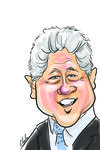Bill Clinton
William Jefferson Bill Clinton born William Jefferson Blythe III was the 42nd President and the third youngest President of the United States of America. He is married to former Senator and current Secretary of State Hillary Rodham Clinton and their only child is Chelsea Victoria.
 |
 |
| Country: | USA |
| Website: |
|
Clinton's administration is responsible for the initiatives and directives that helped to establish the Internet as it is today along with ICANN and the Domain Name System.
Early Life
President Bill Clinton was born in Hope, Arkansas on August 19, 1946. He was named after his father William Jefferson Blythe II, who died in a car accident before Bill was born. His mother, Virginia Cassidy Blythe, was a nurse and re-married to an automobile salesman, Roger Clinton. Bill decided to legally change his surname from Blythe to Clinton when he was a teenager. During his senior year in high school, Bill was among the students chosen to participate in the Boys Nation, a special youth leadership conference in Washington D.C., and meet President John F. Kennedy at the White House. Meeting President Kennedy was one of his most important and memorable experiences and it served as an inspiration for him to become President of the United States and serve his countrymen. Dr. Martin Luther King Jr. also inspired Bill, particularly his "I Have a Dream" speech. Clinton considers Dr. King as one of his heroes.[1]
Educational Background
Bill Clinton graduated with a degree in Bachelor of Science in International Affairs at Georgetown University. He also studied Government at Oxford University in England after receiving a Rhodes Scholarship in 1968. After studying in England, he enrolled at Yale University where he earned his degree in Law in 1973.[2]
Public Service
He returned to Arkansas after graduating Law from Yale in 1973 and taught Law at Arkansas University. In 1974, Bill Clinton lost his first attempt to enter politics as a Congressman against Republican incumbent John Paul Hammerschmidt. In 1976, he became Attorney general of Arkansas. Two years later, he was elected governor and became the youngest governor in the United States. He lost his bid for his second term as governor in 1980. In 1982, he was re-elected as governor under the Democratic Party. He served as governor of Arkansas until 1993 and became chairman of the National Governor Association from 1986-1987.[3]
In 1991, Clinton was nominated as the Democratic Presidential candidate and selected Al Gore as his Vice-Presidential running mate. He defeated President George Bush and independent candidate Ross Perot during the 1992 presidential election and he became the 42nd President of the United States while Al Gore became 45th Vice-President. Clinton was known as the "New Democrat." In 1996, Clinton and Gore served their second term as President and Vice President of the United States. Clinton was the only president under the Democratic party who served a second term after Pres. Franklin D. Roosevelt.[4]
As President Clinton enjoyed high approval ratings and succeeded in implementing progressive reforms such as improvement of the welfare system, strengthened environmental regulations, the establishment of the framework for global electronic commerce, created more jobs, succeeded in expanding international trade and peace initiatives in Africa, Middle East and he also promoted a framework for peace to end the conflict in Northern Ireland. Clinton left the White House with a budget surplus.[5]
Internet Policy
Framework for Global Electronic Commerce
See the article on Framework for Global Electronic Commerce.
Green Paper
On January 30, 1998, Magaziner released the Green Paper, which discusses the Proposal to Improve the Technical Management of the Internet Names and Addresses. The National Telecommunications and Information Administration published the Green paper in the Federal Register for public comment and received more than 650 comments until the comment period ended on February 20, 1998.[6]
The Green Paper received strong opposition and its critics argued that the creation of NewCo or the New IANA, or any new non-profit organization would be a mere front of the government's intention to retain control of the internet. Others were concerned that the proposal would lessen the roles of ISOC and WIPO.[7]
White Paper
Due to the negative reaction to the Green Paper, Magaziner made a revision and released the White Paper, Management of the Internet Names and Addresses which include the public comments on the Green Paper and the government's official response or statement policy on the comments. It also emphasized the need for consensus among the Internet's stakeholders in the creation of a new non-profit internet corporation that will administer policies of the internet name and address system.
Establishment of ICANN
By October 1998, a decision to establish a new non-profit organization, which was to be officially called Internet Corporation for Assigned Names and Numbers was announced by NTIA. It will operate under an agreement with the NTIA with oversight from the US Congress. ICANN was officially incorporated on November 21, 1998, and it was expected to maintain competition in domain registration services, create new gTLDs, promote international participation and operate in an open and transparent manner.[8]
Clinton During the ICANN 40 Meeting
Former Pres. Clinton spoke during the 40th ICANN Meeting which was held in San Francisco on March 16, 2011. During his speech, the former president described himself as "the president at the dawn of the Internet age". It was recalled that he was instrumental in enhancing internet commerce and the creation of ICANN. When he first assumed his position as President of the United States in 1993 there were only 50 websites, it grew to 36 million in 2001 when his term as President ended.
During his speech, Clinton emphasized that ICANN succeeded in its goal of improving the internet as an independent and international governing body. He also encouraged the global internet community to use their position and technology to build physical and financial infrastructure systems for poorer nations, and address the world's most pressing problems. He emphasized the need for a renewed focus on increasing jobs in the technology sector and the geopolitical implications of free internet access and urged the participants in the meeting to keep the internet young. Furthermore, Clinton said:
"We need to ask ourselves if we are forming a more perfect union across the globe. You have to be vigilant because at some point all institutions are led by people more interested in maintaining the present than creating the future."[9]